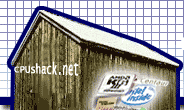


 |
 |
 |
| home | about | pictures | reference | trade | links |
How a CPU Microprocessor is made.
Etching

| 1. Oxide | A layer of oxide is implanted on the wafer. This is most often done by exposing the wafer to steam at very high temperatures |
| 2. Photoresist | A layer of organic photoresist is applied. This is like film in a camera |
| 3. Masking | A mask is applied and UV light is shown through the gaps. UV light is now used because of its shorter wavelength. A shorter wavelength means that it can pass through a smaller mask. The UV light hardens (fixes) the photoresist. |
| 4. Cleaning | The unhardened mask is removed with an organic solvent |
| 5. Etching | Hydroflouric (HF) acid is used to etch away the Silicon Oxide. Since HF is inorganic it does not attack the photoresist. |
| 6. Cleaning | The remaining photoresist is washed away. The wafer is now ready for doping with another type of silicon. Or for adding contacts. |
Making the tranisistor

| (A) | A p-type wafer (silicon doped with Boron) has a epilayer of n-type (silicon doped with Phosphorous or Arsenic) |
| (B) | A mask is used to implant Silicon Dioxide, for the insulator |
| (C) | Acceptor atoms (Boron) are diffused into the window in the Silicon Dioxide |
| (D) | Using another mask additional Silicon Dioxide is grown. and donor atoms (elements like Arsenic with excess electrons) are implanted. |
| (E) | Another mask is used to grow additional Silicon Dioxide. ANother mask is then used to implant evaporated Aluminum or Copper for the contacts. This is a Bipolar Junction Transistor (BJT). |
MOS Tranistor

These transistors are what are used in microprocessors and memory. They take
less power then BJTs but are made in the exact same way.
This work is all done in 'clean rooms' as even the smallest particle of dust
can wreck a whole chip!!
The workers wear 'bunny suits' to keep dust and skin particales from getting
into the air.

These days much of the process is automated so the technicians have to monitor
alot of sophisticated machines.

A fab requires large amounts of infrastructure to deal with all the chemicals,
high temperatures, and pressures.

Intel fab - external plumbing
Continue to: Wafer full of
chips - Making of the Microprocessor
Making of Microprocessors 1 - 2
- 3 - 4